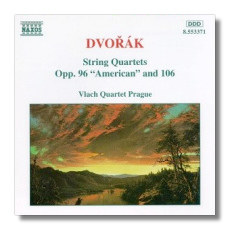
The Internet's Premier Classical Music Source
Related Links
- Dvořák Reviews
- Latest Reviews
- More Reviews
-
By Composer
-
Collections
DVD & Blu-ray
Books
Concert Reviews
Articles/Interviews
Software
Audio
Search Amazon
Recommended Links
Site News
 CD Review
CD Review
Antonín Dvořák

String Quartets #12 and 13
- String Quartet #12 "American", Op. 96
- String Quartet #13, Op. 106
Vlach Quartet Prague
Naxos 8.553371 DDD 69:15
Oh no! I thought to myself, Nancy! (Not Another Naxos Cycle).
However this particular disc, unusually, seems to be a one-off and not the beginning of a complete set of the great Czech composer's quartets.
Which is a pity, as Dvořák playing of this order is hardly a commonplace.
The "American" quartet is justly popular and there are many accounts already in the catalogue. What singles this one out, for me, is not simply the price – although that doesn't hurt of course – but the singular freshness of the playing.
When you listen to as many new discs as I do – and, believe me, I listen to a lot – you realise that there are essentially three categories of recording: the ones which immediately strike you as being particularly bad, the ones whose true worth takes some time to emerge and the ones which make you sit up and pay attention from the very first bar.
Most, of course, fall into the second category and require (often considerable) further listening; few – I am glad to say – fall into the obviously bad class. But very few fall into the category of obvious winners. This disc is one of the select handful which not only appeal immediately, but whose charms remain, indeed increase, with repeated listening.
Dvořák wrote the "American" during his stay with the Bohemian community in Spillville, Iowa in 1893; like the two other major works composed during his American sojourn – the "New World" Symphony and the Op. 97 String Quintet (another work which deserves a far wider recognition than it currently enjoys) – the quartet combines altogether delightful themes (Dvořák outdoing even his seemingly unconstrained talent for melody) with a sense of discovery and a certain wistfulness for his own homeland.
The Quartet #13 is less popular – as indeed are all of Dvořák's other quartets, the "American" seems to have been recorded at least twice as often as any of them – and its special qualities take rather longer to surface; like the late tone poems there is often a rather more sombre feel to this particular work, although it never approaches the morbidly tragic mood of, say, The Noonday Witch.
Still, I cannot think of a better introduction to either quartet and, even if you already have a recording of the "American", this is well worth considering. There always seems to be something very special about performances of Dvořák by Czech musicians and these are no exceptions; there is a spring and litheness to the playing which you only need to sample the opening bars of the "American" to hear for yourself.
Moreover the recording – made in the Prague – is first-class, and entirely free of the over-reverberance which has marred some of the same company's other quartet recordings, particularly some of the later discs in the Kodály Quartet's Haydn cycle, recorded in the Unitarian Church in Budapest, a venue which Naxos would do well to avoid until they can learn to tame its cavernous acoustic.
I am still hoping that it is solely due to a printing error that the magic words "Volume One" don't appear on this disc.
Copyright © 1996, Deryk Barker


















